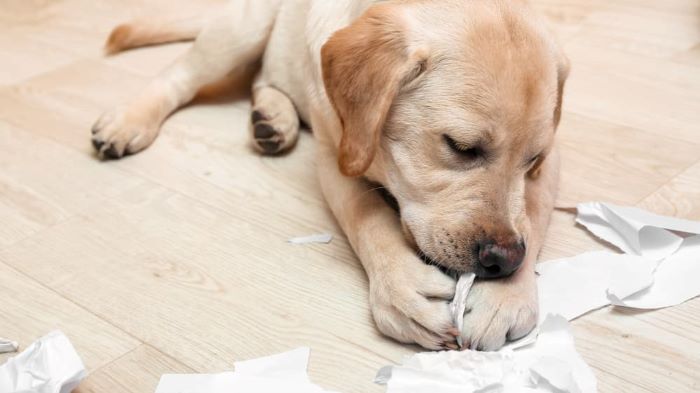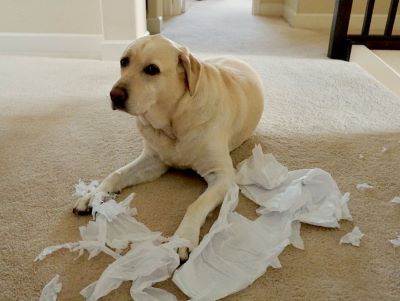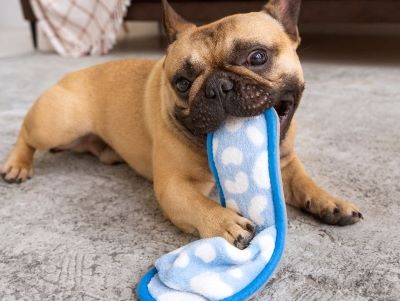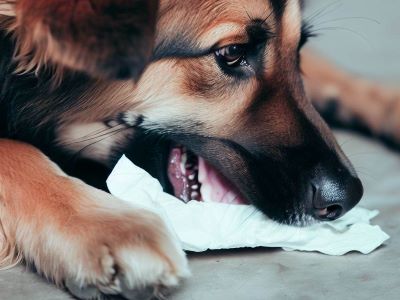Women use pads, which are absorbent fabrics, to collect menstrual blood and other vaginal discharge. According on the user’s requirements and preferences, they are available in a variety of forms, sizes, and sorts.
However, Dogs may be drawn to pads and find them attractive to lick, consume, or otherwise interact with. Why does my dog eat my pads? How does this conduct affect others?

In this article, we will explore some of the possible causes of pad eating behavior in dogs, as well as the potential risks and complications that it can entail.
We will also provide some tips on how to prevent and treat this problem, and when to seek professional help. If you have ever wondered why does my dog eat my pads?, or how to stop them from doing so, read on to find out more.
Contents
What Are the Possible Causes of Dogs Eating Pads?
Dogs are curious and opportunistic animals that may eat all kinds of things, including sanitary pads.[1] This behavior can be puzzling and disturbing for dog owners, who may wonder why their dogs would do such a thing.

There are several possible reasons why dogs may eat pads, ranging from natural instincts to behavioral issues. Here are some of the most common ones:
Curiosity and Exploration
Dogs are curious animals that like to explore their surroundings with their noses and mouths. They may be attracted to the smell or taste of blood on the pads, or they may just want to try something new.
Particularly puppies may chew on pads to learn about their surroundings or ease teething discomfort.
Hunger or Nutritional Deficiency
Dogs may also eat pads because they are hungry or lack certain nutrients in their diet. The minerals that dogs need may be found in pads.
Dogs that are malnourished or have medical problems that affect their appetite or digestion may start consuming things other than food to satisfy their hunger.
This might also be a sign of a disorder called pica, which causes dogs to eat items they shouldn’t due to anemia, zinc deficiency, or other issues.
Boredom or Anxiety
Another reason why dogs may eat pads is because they are bored or anxious.
When given little attention, exercise, or mental stimulation, dogs may turn to chewing or shredding pads to pass the time or relieve stress.
In order to cope with their worry or to get their owners’ attention, dogs with separation anxiety may also consume paper towels.
Scavenging Instinct
Dogs are scavengers by nature and are drawn to pungent odors associated with decay.
Dogs’ sense of smell and their natural desire to hunt may be stimulated by the aroma that pads left on the floor or in the garbage can may release.
Dogs could consider pads to be a source of prospective food or a method to demarcate their territory.
OCD or Pica
Some dogs may eat pads because they have a compulsive disorder that makes them repeat certain behaviors without reason.[2]
This may be brought on by inherited traits, pressures in the environment, or neurological issues.
Regardless of the risks, dogs with OCD may repeatedly lick, chew, or swallow pads or other things. As was previously indicated, this is also connected to pica.
Potential Risks and Complications of Dogs Eating Pads
Eating pads is not only a disgusting habit, but also a dangerous one for dogs.

Pads are made of synthetic materials and chemicals that can harm your dog’s health in various ways. Here are some of the possible risks and complications of eating pads:
Choking or Suffocation
If your dog tries to swallow a whole pad or a large piece of it, it can get stuck in his throat and block his airway. If left untreated, this can result in excruciating discomfort and respiratory problems, and it may even be fatal.
While your dog is around pads, keep an eye on him and take out any bits he could have bitten off.
Intestinal Blockage or Perforation
Pads can also get lodged in your dog’s intestines and cause an obstruction or a perforation.
This can stop food from moving through the digestive system and result in symptoms including bleeding, vomiting, diarrhea, loss of appetite, weight loss, edema, fatigue, and weakness.
This is a potentially fatal condition that needs emergency veterinarian care.
Infection or Toxicity
Pads may contain bacteria, fungi, or toxins that can infect your dog’s mouth, stomach, or intestines.
This may result in poisoning, ulcers, rashes, or swelling. Bleach, dyes, perfumes, and superabsorbent polymers are just a few of the chemicals that might be dangerous if consumed in significant amounts.
They may result in allergic responses, organ deterioration, or metabolic problems.
Dental Problems or Injuries
Chewing on pads can also damage your dog’s teeth and gums. Pads may be abrasive and wear down the enamel, or they may be sticky and cause plaque buildup.
This may result in periodontitis, gingivitis, or other dental issues including cavities.[3]
Moreover, pads have the potential to cut, scratch, or pierce your dog’s lips. These are susceptible to infection and can be uncomfortable.
Signs and symptoms of dog eating pads:
- Vomiting or diarrhea
- Loss of appetite or weight
- Abdominal pain or swelling
- Lethargy or weakness
- Fever or bleeding
Effective Solutions and Prevention Tips for Dogs Eating Pads

Some practical tips and advice on how to prevent and stop your dog from eating pads, such as:
- Dispose of your pads properly and securely, using a vandal-resistant bin or a closed cabinet.
- Keep your bathroom door closed or use a baby gate to restrict access.
- Provide your dog with adequate nutrition and hydration, checking for any deficiencies or medical conditions.
- Offer your dog alternative toys or treats to chew on, especially if they are teething or bored.
- Engage your dog in regular exercise and mental stimulation, such as walks, games, or training.
- Reward your dog for good behavior and ignore or redirect bad behavior, using positive reinforcement techniques.
- Consult your veterinarian if your dog persists in eating pads or shows any signs of complications.
FAQs
Why does my dog eat my menstrual pads?
Your dog may eat your menstrual pads because they love the stinky bloody smell, which triggers his hunting or scavenging instinct.
He may also be curious, bored, anxious, or hungry, and find chewing or shredding pads as a way of satisfying his needs. Eating pads can be dangerous for your dog, as they can cause choking, intestinal blockage, infection, toxicity, or dental problems.
Why does my dog eat pads and tampons?
Your dog may eat pads and tampons for similar reasons as he eats menstrual pads. He may be drawn to the scent of blood or other bodily fluids on the pads or tampons, or he may be exploring, playing, or relieving stress or boredom by chewing on them.
Why do dogs eat pads and diapers?
Dogs eat pads and diapers because of the urine or feces smell or other reasons. Eating pads and diapers can harm your dog’s health.
Does my period affect my dog?
Your period may affect your dog in different ways. Some dogs may become more attentive, protective, or affectionate towards you when you are on your period, as they can sense the hormonal changes in your body.
Conclusion
In the conclusion of why does my dog eat my pads?, Dogs’ pad eating habits can be caused by a variety of factors, including hormones, curiosity, boredom, anxiety, or hunger.
However this activity can also put your dog’s health at danger for significant issues including choking, intestinal blockage, infection, or poisoning. Therefore, this issue has to be avoided and treated as soon as feasible.
This may be achieved by properly disposing of your old pads, keeping them out of your dog’s reach, giving your dog enough exercise and mental stimulation, treating any underlying problems that might be causing this behavior, and getting emergency care if necessary.
We hope this article has been helpful and informative for you and your dog. Remember to follow the tips and advice provided, and to seek professional help if needed. Thank you for reading!
“Your dog may love you more when you are on your period, but he doesn’t need to eat your pads, tampons, or diapers. Keep them away from him and save him from trouble.”
References:
- Park, C., Barakat, R., Ulanov, A. V., Li, Z., Lin, P., Chiu, K., Zhou, S., Pérez, P. A., Lee, J., Flaws, J. A., & Ko, C. (2019). Sanitary pads and diapers contain higher phthalate contents than those in common commercial plastic products. Reproductive Toxicology, 84, 114–121. – ScienceDirect
- Morrison, B. J., DVM. (2023). Pica in Dogs. – PetMD
- Periodontal disease. (2023, May 5). Cornell University College of Veterinary Medicine. Retrieved July 3, 2023, from – CVM

When it comes to dogs, Julia ignores nothing. Being an animal behaviorist, dog trainer and a dog parent she knows exactly how even a tiny change in a dog’s surroundings and diet can leave dogs disturbed for a longer duration. Hence, she always makes sure to review for us only the best products for dogs out there.

